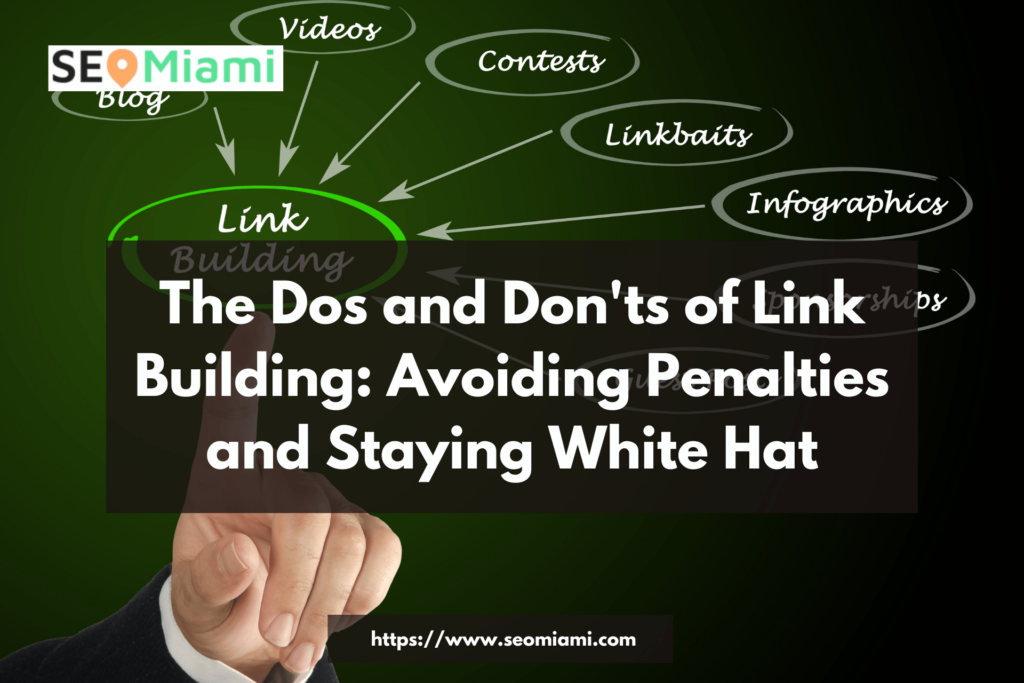Link building is a crucial aspect of search engine optimization (SEO) that involves acquiring links from other websites to your own. These links act as “votes of confidence” in the eyes of search engines and help improve your website’s search engine rankings. However, not all link building practices are equal in the eyes of search engines. Some practices can lead to penalties or even result in your website being banned from search results. That’s why it’s important to follow link building do’s and don’ts and stay “white hat” in your approach.
The Dos of Link Building
- Focus on Quality Over Quantity One of the most important aspects of link building is to focus on the quality of the links you acquire, rather than the quantity. Search engines like Google prioritize high-quality, relevant links over a large number of low-quality links. This means you should aim to get links from authoritative and relevant websites in your niche, rather than from spammy or irrelevant sites.
- Use Natural, Relevant Anchor Text Anchor text is the text that is used as the clickable link. When building links, it’s important to use natural and relevant anchor text that accurately reflects the content of the linked page. Avoid using over-optimized or irrelevant anchor text, as this can be seen as spammy and lead to penalties.
- Create Quality Content Another important aspect of link building is creating high-quality, relevant content that other websites will want to link to. The better the content you create, the more likely other websites will be to link to it and share it with their audience.
- Utilize Social Media Social media can be a great tool for promoting your content and acquiring links. Share your content on social media platforms and engage with other users in your niche. This will help increase visibility for your content and increase the chances that others will link to it.
- Reach Out to Other Websites Reaching out to other websites in your niche is another effective way to acquire links. This can be done by commenting on blog posts, reaching out to website owners directly, or participating in relevant online communities. Be sure to provide value to others and avoid simply asking for a link in exchange for nothing.
The Don’ts of Link Building
- Don’t Engage in Link Farms or Link Networks Link farms and link networks are groups of websites that are created specifically for the purpose of exchanging links. These types of links are typically low-quality and can lead to penalties from search engines. Avoid participating in link farms or link networks at all costs.
- Don’t Purchase Links Purchasing links is another common link building practice that is seen as spammy by search engines and can result in penalties. Instead of buying links, focus on acquiring links through quality content and outreach.
- Don’t Use Automated Link Building Tools Automated link building tools can be tempting because they promise quick results, but they often result in low-quality links that can lead to penalties. Avoid using these types of tools and focus on building high-quality links through manual outreach and content creation.
- Don’t Participate in Link Exchanges Link exchanges are agreements between two websites to link to each other. While this may seem like a quick and easy way to acquire links, these types of links are often low-quality and can result in penalties. Instead, focus on acquiring links from high-quality, relevant websites.
- Don’t Use Spammy Anchor Text Using spammy anchor text, such as “click here” or “read more” is a big no-no in link building. Not only is it seen as spammy by search engines, but it also provides no context or relevance to the linked page. Instead, use descriptive, relevant anchor text that accurately reflects the content of the linked page.
In conclusion, link building is a critical component of SEO, but it must be done correctly in order to avoid penalties and stay within the guidelines of white hat SEO practices. Focus on quality over quantity, use natural and relevant anchor text, create high-quality content, utilize social media, and reach out to other websites in your niche. Avoid link farms, purchasing links, using automated link building tools, participating in link exchanges, and using spammy anchor text. By following link building do’s and don’ts, you’ll be able to build a strong and sustainable link building strategy that will benefit your website in the long run.
